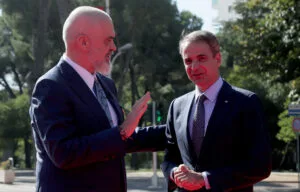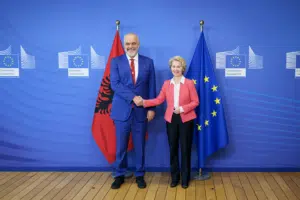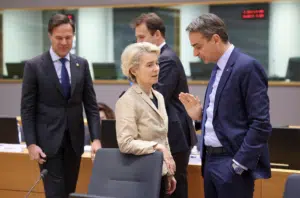From the correspondent in Strasbourg – The match between Greece and Albania is moving to Strasbourg, to the European Parliament Chamber. Fredis Beleri, the ethnic Greek mayor of the Albanian municipality of Himarë sentenced to two years in prison for vote buying and selling in the May 2023 municipal elections, but was the third most voted candidate in Greece in the June 9 European elections from the ranks of the ruling New Democracy party, will be at the inaugural session July 16-19. The Albanian judiciary allowed him to participate in the work of the EU institution this week, requiring his return to prison to serve the remainder of his sentence in Albania immediately after the end of the plenary session.

According to Greek media reports, Beleri left prison in Albania this morning (July 15) on a five-day leave, traveling to Tirana before flying to Athens and from there to Strasbourg. He will be able to participate in the vote for the election of the Presidency of the EU Parliament, the top posts tomorrow (July 16), and the confirmation of Ursula von der Leyen to head the European Commission on Thursday (July 18), but he will have to remain in constant contact with Albanian police before returning to prison as early as this weekend. “Respect for the right to vote and to be elected is a key element of any rule of law,” said the (Greek) Vice-President of the EU Commission responsible for European Lifestyle, Margaritis Schinas.
According to the provisions of the European Parliament’s internal regulations, its members enjoy immunity from prosecution, even if the charges relate to crimes committed before their election. However, ‘Protocol 7’ explicitly refers to the application of immunity on the territory of EU member states, so there are no grounds in Beleri’s case, despite his election as an MEP, as he is serving time for a crime committed in Albania, a non-EU country. The Albanian Special Court of Appeal on June 25 upheld the March first-degree conviction and removed Beleri from office as mayor of Himarë (new elections are on August 4). After officially taking office tomorrow, the newly appointed MEP will most likely appeal to the European Court of Human Rights in the coming months.
The Beleri case between Greece and Albania
Beleri’s case had already emerged as a point of friction at the European tables during the informal dinner between the heads of the EU institutions and the leaders of the Western Balkans, Ukraine, and Moldova in Athens at the end of August last year. Only Albanian Premier Edi Rama was missing from that meeting after not being invited because of tensions between Greece and Albania over the detention of the elected mayor of Himarë, who was never able to be sworn in as he had been detained in jail for two days before the May 14 elections on charges of vote buying (the challenger and incumbent mayor Jorgo Goro, also went to prison for corruption). From that moment on, a diplomatic tug-of-war began between the governments of Kyriakos Mitsotakis and Rama, the former accused by Tirana of trying to influence an independent investigation into a figure associated with the 1994 armed uprising of the Greek minority in Albania, the latter suspected by Athens of “human rights violations” and a “politically motivated” trial.

So far, the Greek government has failed to exert sufficient diplomatic pressure for Beleri’s release, and even the threats of negative consequences on Albania’s path to EU membership (with negotiations that started in July 2022) have not had the desired effect. Greece argues that the Beleri case should be seen as a European issue and not just a bilateral one – -as it would concern the respect for the rule of law and minority rights in a country aspiring to join the Union — but the stretch has annoyed some of the Twenty-seven most supportive of accelerating the enlargement process, such as Germany. So the Greek Premier decided to take a more ‘original’ route, and on April 15, Beleri was officially nominated as the 25th candidate (out of 42) on the New Democracy electoral lists. “His nomination has strong symbolic significance. Everyone interested in the rights of the Greek ethnic minority in Albania understands that” Mitsotakis had said two days later on the sidelines of the European Council in Brussels..

With Beleri’s election to the European Parliament, New Democracy shifts the center of gravity of political discourse to the patriotic level, leveraging what has become a rhetorical battleground for Greek and Albanian nationalism. Technically, Tirana and Athens are still in a state of war – since 1940, when Albania was an Italian protectorate during World War II – and despite the Treaty of Friendship, Cooperation, Good Neighborliness, and Security that has been in force since 1996, the two NATO members are experiencing escalating diplomatic tensions, which also closely involve the EU institutions and the enlargement process.
English version by the Translation Service of Withub






